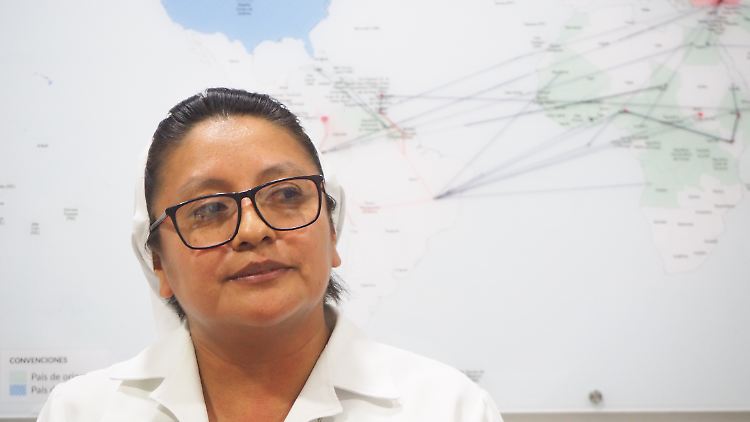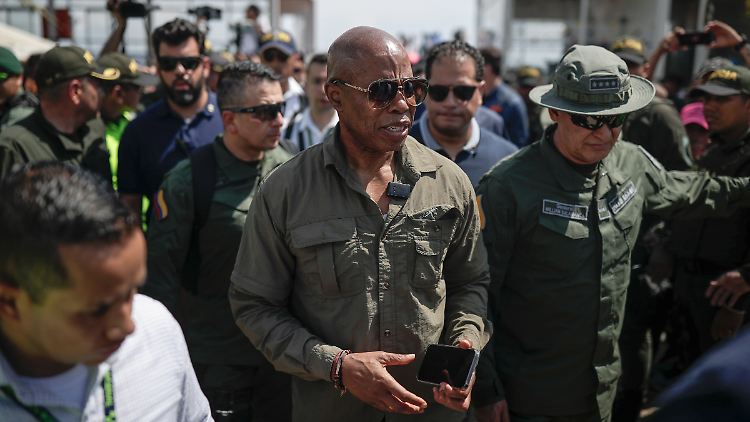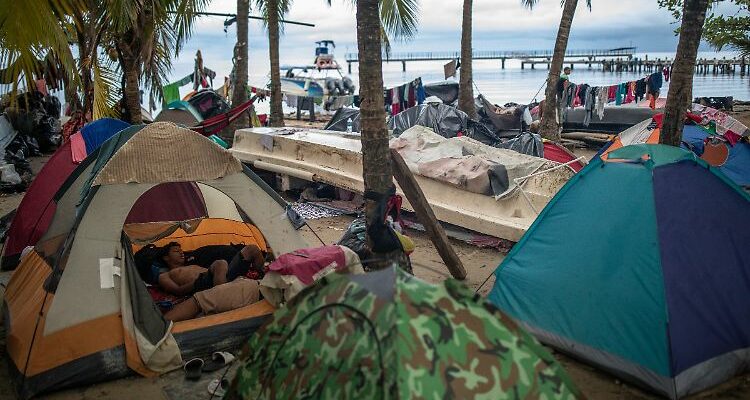500,000 people heading to the USA
Colombia’s most powerful drug clan controls migrants
By Roland Peters, Gulf of Urabá
December 28, 2023, 1:29 p.m
More people never migrated north from South America. This is made possible by Colombia’s largest criminal organization. Their pockets are filled by hundreds of thousands of migrants – who risk their lives in the life-threatening jungle to do so.
A few men in camouflage-stained raincoats direct those who have arrived over a long raft into smaller boats. Most of them don’t want to stay here. They are migrants who want to cross the life-threatening jungle between Colombia and Panama, the Darién. Everything is organized for this: everyone has bags with them, some have rain boots, tents, sleeping mats. For a fee they received a wristband and were taken from the floating ship terminal just outside the Colombian town of Acandí to a special pier. From there you can travel a little further by motorcycle taxi with an open loading area. Then a several-day-long walk through the jungle begins.
Up to 2,000 migrants cross the Gulf every day from the towns of Turbo or Necoclí to Acandí or Capurganá. The continent’s only new land routes to Central and North America, and thus also to the USA, begin there. Three years ago only around 10,000 people dared to go through the “Tapón del Darién”. This year, more than 500,000 migrants passed through the now fragile “plug”. It’s a lonely record. Most of them are Venezuelans. They are part of the largest recorded refugee movement from South to Central America. Aid organizations are expecting even more people next year.
There is no official border crossing on the dangerous overland route to Panama on the Colombian side. Exit checks by the Colombian authorities only take place sporadically when crossing from the two jetties in Necoclí. Migrants without valid documents are ignored. The jungle used to be considered almost impenetrable and was controlled by paramilitaries or the FARC guerrillas. First the paramilitaries laid down their weapons almost twenty years ago, and from 2016 onwards the guerrillas did too. Since then, the Clan del Golfo, the most dangerous and powerful criminal group in the country, has held sway here, almost unchallenged.
Fates under palm trees
Migrants pitch their tents under the palm trees of Necoclí beach and mingle with locals and tourists sipping drinks in beach bars. The Catholic Church in Germany is currently financing the construction of a soup kitchen for around 80 migrants. Childcare and parental advice should be added. At the beginning of October, three men camped on a narrow strip of beach. In the community of shared fate, everyone has a different story to tell.
“I was at the US border in May when Title 42 was repealed,” says Mayber Castañedo. Because of the corona pandemic, the USA blocked new asylum applications using this regulation. The 34-year-old Venezuelan wanted to go to the USA with his cousin. To do this, they fought their way through the Darién, covering around 4,700 kilometers through the whole of Central America. Mayber Castañedo spent 1,200 US dollars. But they were caught while crossing the Rio Grande into the US state of Texas. They let the cousin go. He spent months in prison in Laredo until the US border authorities finally deported him and flew him back to Venezuela’s capital Caracas. Now he is back on Necoclí beach and wants to try again with the other two. Mayber Castañedo is waiting for money transfers from Florida from his cousin.
The Clan del Golfo alias Urabeños, the most powerful criminal group in Colombia, makes its money primarily from drugs. The refugee movement north has now become another lucrative business: The Colombian military estimates that the clan earns around $125 per migrant, including through tolls. Extrapolated, at least $62.5 million flowed into the pockets of the Urabeños’ approximately 3,500 permanent members and 14,000 allies this year. Their tariffs mean no protection: The men report seven torturous days through the jungle; of the corpses of those who didn’t make it; of brutal robbers and people with open wounds that no one can help.


Almost all roads lead to the red dot Necoclí: nun in front of a world map with travel routes on the wall of a local church facility that helps migrants.
(Photo: Roland Peters)
Global refugee routes converge in Necoclí. Aid organizations have already registered over 50 different nationalities: They come from all over South America, the Caribbean, even Africa and Asia to cross the Gulf from here. It is the bottleneck on the way north. Many Venezuelans do not come directly from their crisis-torn homeland, but have completed a years-long odyssey across the South American continent after fleeing hunger and political persecution. Most want to go to the United States. More migrants than ever before have been apprehended at the southern border there this year. Even in New York, far from the southern border, there is an emergency due to the large number of refugees.
In Colombia, the Chinese, among the various nationalities, travel in luxury, church helpers report: They spend up to 10,000 US dollars to be taken by boat by sea past the jungle under the cover of night. Regular migrants pay around $350 to $500 to cross the Gulf and walk through the jungle. There are many families and mothers with their children among them.
Church as a neutral actor


New York Mayor Eric Adams (center) also traveled to Necoclí in October – and warned against false promises from the clan.
(Photo: AP)
Local people only talk about the clan, if at all, behind closed doors and in quiet tones. “The Unspeakables” have a say in life, no one doubts that. Some of the Urabeños no longer want people to talk about “migrants,” say diocese representatives, who can move relatively freely in the region because the Catholic Church doesn’t take sides. Most recently, the clan passed a “law” for the population of Capurganá: it was now forbidden to use the word “migrants”, they should be called “travellers of peace” instead. Violation carries a penalty of two monthly minimum wages.
Although the Urabeños are the largest, they are only one armed group active in Colombia. There are influential FARC units in various parts of the country, around 5,000 fighters, who are still under arms. There is the other major left-wing guerrilla ELN, which also has thousands of members. But there are also paramilitaries and criminal gangs. President Gustavo Petro wants to do it with everyone at the same time paz totally, to achieve “total peace”, i.e. to negotiate at the same time as possible. This is extremely difficult because of ongoing violence; agreed ceasefires are repeatedly broken. But in order to get migration under better control, the state on the Gulf of Urabá would have to be in charge.
The person who was supposed to negotiate “total peace” was Danilo Rueda in October. On the terrace of a hotel in the capital Bogotá, he reports on the difficult process: “We have cancer and are trying chemotherapy,” he makes an impressive comparison of the approaches. “The clan has replaced the state,” says Rueda about its core area in Colombia’s northwest and the migration north. At the same time, however, it should not simply be demonized: “Every exclusion of armed groups leads to more violence.” Breaking the power of criminal groups in a country where weapons have been the deciding factor in conflicts for decades – it is a historic task.
The research took place as part of a press trip and with the support of Adveniat instead, the Latin America relief organization of the Catholic Church in Germany.

